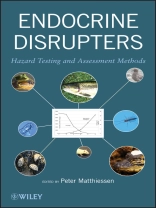Enables researchers to assess the effects of endocrine
disrupters as well as comply with new environmental
regulations
Endocrine disrupters are chemicals–both man-made and
natural–that interfere with the body’s endocrine system,
potentially resulting in adverse developmental, reproductive,
neurological, and immune effects. In recent years, a number of
regulatory authorities around the world have drafted or enacted
legislation that requires the detection and assessment of the
effects of endocrine disrupters on both humans and wildlife. In
response, this book provides comprehensive, up-to-date information
on the latest tested and proven methods used to detect and assess
the environmental hazards posed by endocrine-disrupting
chemicals.
Endocrine Disrupters is divided into chapters covering
each major taxon as well as chapters dedicated to hazard assessment
and regulation. The book covers testing methods for all the
vertebrate groups and several invertebrate phyla, including:
* Crustaceans and mollusks
* Insects
* Fish
* Amphibians and reptiles
* Birds and mammals
Moreover, the book emphasizes practical, ethical testing methods
that combine sensitivity, efficiency, statistical power, and
reasonable cost.
Each chapter is written by one or more international experts in
ecotoxicology, offering readers step-by-step guidance for
implementing each method based on the latest research and the
authors’ firsthand laboratory experience. Furthermore, all the
chapters have been subjected to a rigorous peer review and edited
in light of the reviewers’ comments. References at the end of each
chapter guide readers to the literature in the field.
Endocrine Disrupters is recommended for scientists who
need to test chemicals for possible endocrine-disrupting
properties. It is also recommended for regulatory authorities who
need to decide whether particular chemicals can be safely
marketed.
Sobre o autor
PETER MATTHIESSEN, Ph D, is an aquatic ecotoxicologist who
works as an independent consultant. Specializing in the study of
endocrine disrupters, he has conducted extensive research into how
sewage effluents cause feminization in wild male fish as well as
how tributyltin-based antifoulants cause masculinization in wild
female mollusks. Professor Matthiessen is a member of the UK
Advisory Committee on Pesticides and Co-chair of the OECD
Validation Management Group for Ecotoxicity Tests. He has
contributed to the development of standardized ecotoxicity assays
with sensitivity for endocrine disrupters as well as written
guidance for the interpretation of the resulting data.












